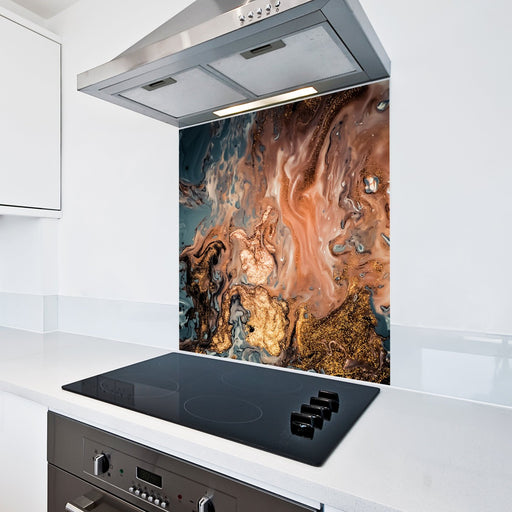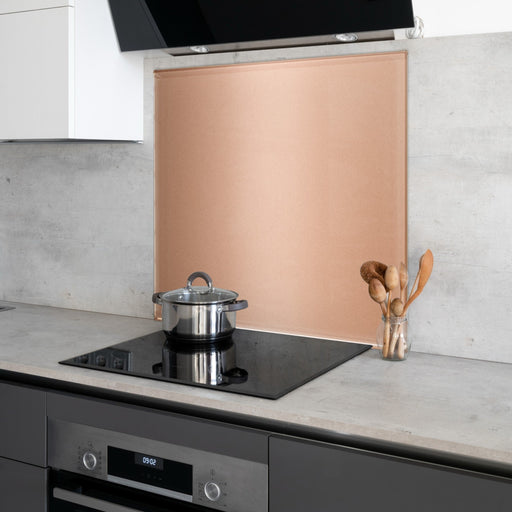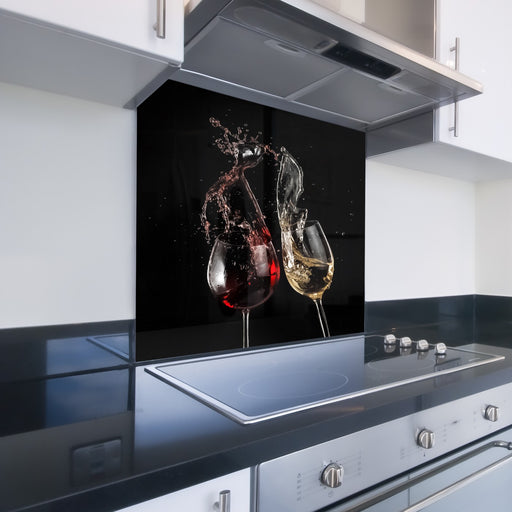Call 020 8500 1188

Glass Splashbacks Vs Acrylic Splashbacks - Which is Best for You?
In the process of upgrading your kitchen?
Whether you’re planning a full refurb or just adding some little extras, choosing the right kitchen splashback should be on your list of priorities.
It may not seem important, but the wrong splashback can have very negative effects, aesthetically and from a safety standpoint.
In this article, we’ll compare glass splashbacks vs acrylic splashbacks to help you decide which one is right for you and your home.
What are glass splashbacks?
Glass splashbacks are wall mounted panels that protect your kitchen walls from… you guessed it, splashes.
Because glass is durable and hard wearing, with proper care, it looks great for a very long time.
So it’s no wonder it’s become a firm favourite with homeowners.
Plus, as technology within the glass industry has evolved, the painted or digitally printed designs that are possible are limitless, meaning you can adapt glass splashbacks to suit any style.
What are acrylic splashbacks?
Acrylic splashbacks perform the same function as their glass counterpart, except they’re made from acrylic plastic. Bet you didn’t see that coming.
Again, just like glass, the durability of acrylic makes it ideal for protecting your wall space, with a range of customisation options available.
What to consider when choosing between a glass splashback and acrylic splashback
Now you’ve got a clearer idea of these two types of splashbacks, it’s time to look at the key points to consider when choosing between glass or acrylic for your kitchen splashback.
1. Designs and colours
You may have a theme or colour scheme in mind for your kitchen upgrade, so choosing a splashback to match is vital.
With both glass and acrylic, the choices available are vast. Opting for a glass splashback provides more colour options, as this detail is added through painting directly onto the glass.
With acrylic, colour choices are often limited as each splashback is cut from a pre-made, coloured sheet.
For intricate designs, like images, both options usually go through a digital printing process.
Generally, there’s not much difference in print quality, and choosing between the two may come down to factors like cost, quality, and lifetime expectancy.
2. Where is the splashback going?
The placement of your splashback has a significant impact on which option you’ll choose.
For instance, if your splashback is going behind a heat source, like a cooker, definitely stay away from acrylic.
Toughened glass is a much safer option, provided it’s a suitable distance away from the heat.
3. Cost
Budget for your kitchen renovation can be a major deciding factor when choosing between an acrylic or glass splashback.
Glass is generally more expensive upfront, but depending on placement, it’ll likely last longer than acrylic due to its scratch resistance.
So, it’s a simple choice between saving money in the short or long term.
4. Cleaning and maintenance
One person’s pain is another’s pleasure and depending which side you’re on, cleaning could be another crucial factor in your splashback choice.
If housework really isn’t your thing, an acrylic splashback may be for you as it doesn’t attract dust in the same way glass does and is easily cleaned with a cloth and some warm soapy water.
On the flip side, glass and dust go hand-in-hand, and glass is also more susceptible to fingerprint marks, smudges and streaks.
You can buy specific glass cleaners or a simple solution of lemon juice in some warm water works just as well.
5. Ease of installation
Choosing your perfect splashback is the first step, you then need to think about the installation process.
Whether you’re planning to go it alone, or use a professional, it’s important to understand what tools and steps are required for a smooth install and a clean finish at the end.
Of the two choices, glass is heavier and requires stronger adhesives to bond it to your kitchen walls.
In some cases, it may also require supports, depending on the smoothness of the surface.
By contrast, acrylic splashbacks are light and will rarely require any additional equipment.
Conclusion
Hopefully we’ve provided you with a great overview of both glass and acrylic as materials for your new kitchen splashback, and have given you some food for thought that helps with your decision.
To recap, if you’re looking for a cheaper, low maintenance option, that offers some variety in-terms of colour and design, acrylic may be for you.
On the other hand, if a sturdier, long-lasting splashback with greater variety in colour choices is up your street, it’s toughened glass all the way.
Ultimately, the decision is yours, and if you do opt for glass, we are sure to have what you need.
Check out our full range of toughened glass kitchen splashbacks or get in touch with us to discuss our bespoke splashback options.
Products you might like
Bespoke Painted Glass Splashbacks
From6mm Toughened Printed Kitchen Glass Splashback - Luxury Abstract Marble Fluid 134
From6mm Toughened Printed Kitchen Glass Splashback. If you would like to upload your own image or request a bespoke size call our dedicated team on...
View full details6mm Toughened Printed Kitchen Glass Splashback - Copper Marble 105
FromProduct Information6mm Printed Toughened Marble Copper Glass Splashback If you would like to upload your own image or request a bespoke size call o...
View full details6mm Toughened Painted Kitchen Glass Splashback - Copper (Metallic Shimmer)
From6mm Toughened Painted Kitchen Glass Splashback. If you would like a different colour or a bespoke size call our dedicated team on 020 8500 1188 for...
View full details6mm Toughened Printed Kitchen Glass Splashback - Wine 360
From6mm Toughened Printed Kitchen Glass Splashback. If you would like to upload your own image or request a bespoke size call our dedicated team on 020...
View full details





